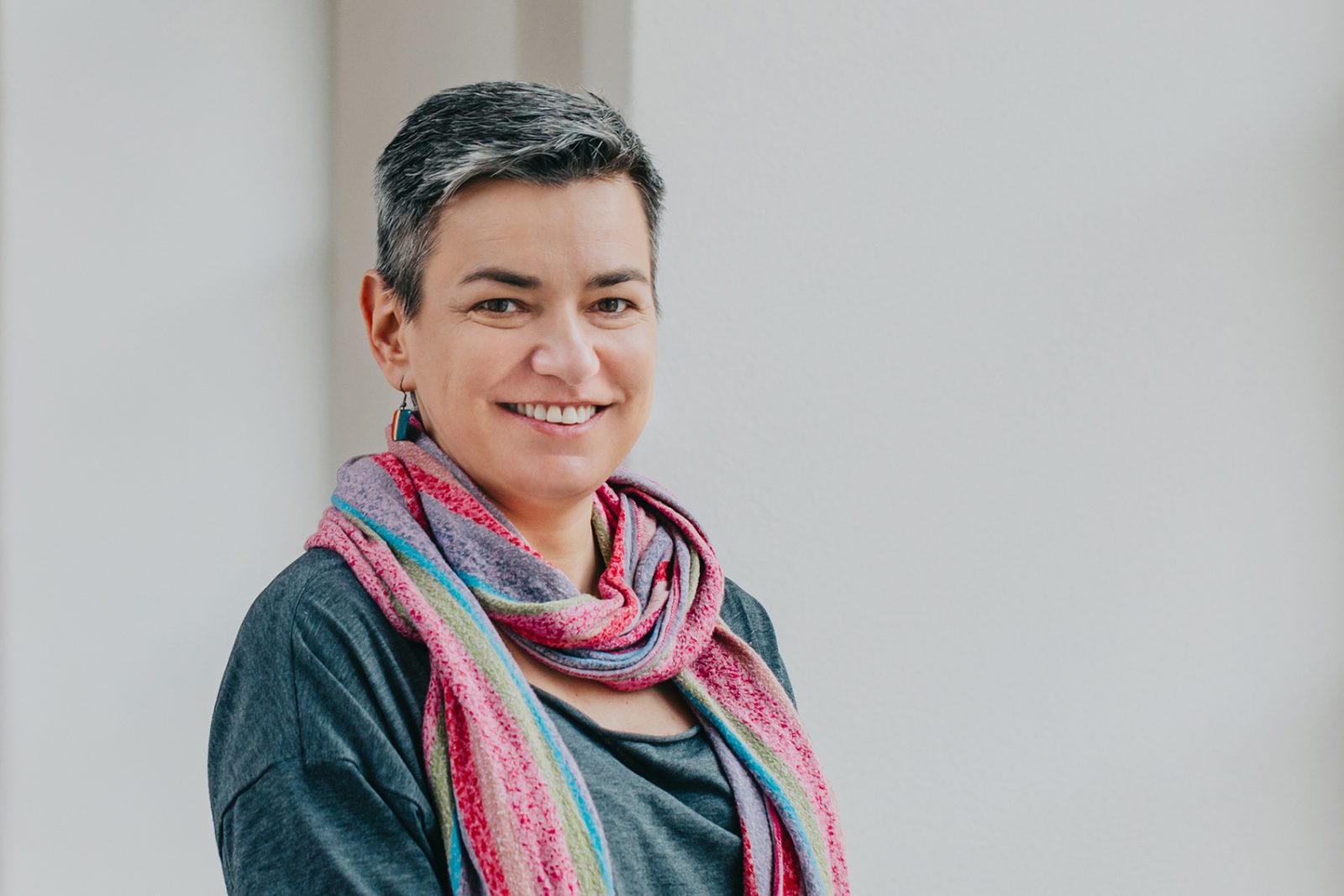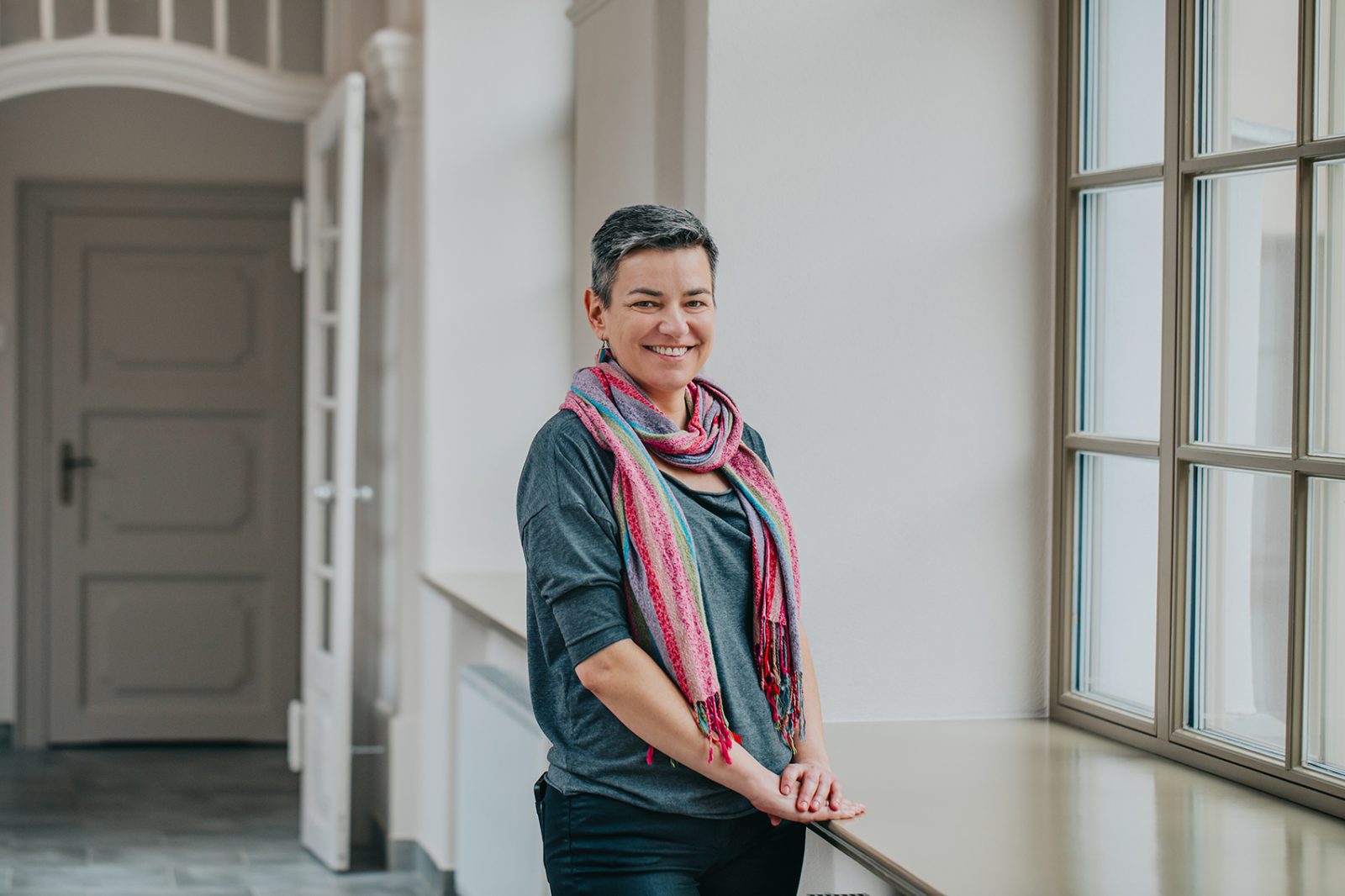
photo: Dominika Hull-Bruska
Dr Małgorzata Dowlaszewicz and Arqus Joint Programmes
Dr Małgorzata Dowlaszewicz works in the Chair of Dutch Studies at the Faculty of Letters. She represents the University of Wrocław in the Arqus European University Alliance, in package 6 ‘Arqus Learning Pathways’. She told us about the Joint Programmes, i.e. studies created jointly by Arqus member universities. Enjoy the interview!
Dr Małgorzata Dowlaszewicz studied Dutch and German Studies at the University of Wrocław and Dutch Literature at the University of Amsterdam. From 2002 to 2004 she was employed as a teaching fellow at Universiti Malaya in Kuala Lumpur. Since 2009, she has been employed in the Department of Old Dutch Literature at the University of Wrocław. In 2012, she received her PhD in Humanities on the basis of her dissertation ‘The Devil in Legend. The depiction of the anthropomorphic devil in the literature of the Netherlands of the late Middle Ages’. Since 2017 she has been the coordinator of the international programme Dutch Language, Literature, and Culture in a Central European Context. Dr Dowlaszewicz’s research interests focus on medieval Dutch vernacular epic and the contemporary reception of Dutch culture and literature.
She has participated in a number of research projects, including Beatrijs Internationaal (2009-2012) and CODL: Het is niet onopgemerkt gebleven. An International Network Studying the Circulation of Dutch Literature (2012-2015), and from 2021 to 2022 she led, together with Prof. Herbert van Uffelen of the University of Vienna, the project DLIT: Dutch Literature in Translation.
What are Joint Programmes within Arqus?
Joint Programmes are International Joint Studies, a term that covers a wide range of different opportunities to create study programmes in which universities from different countries participate. Participation can take many forms, but two elements are key – the joint creation of the programme and the participation of students or staff from all the universities involved.
The Arqus Alliance plans to establish 3 programmes at undergraduate level and 3 at graduate level in the coming years. At least 2 Arqus partner universities should participate in each programme, but priority will be given to consortia made up of as many universities as possible. The universities jointly create the study programme, develop the learning outcomes, and determine the method of graduation. This can be a joint diploma, but also a diploma with a joint supplement, a double diploma or other solutions. For a programme to have a truly international dimension, it must also include an element of student mobility and provide opportunities for mobility of academic staff. In short, such joint degrees mean that students at the various universities cooperating within Arqus follow the same study programme. Arqus has already published calls for joint programmes with funding for their preparation:
Arqus Joint Master’s Programme in International Cybersecurity and Cyberintelligence.
Application deadline: 15th March 2024.
Link: https://arqus-alliance.eu/call/apply-for-arqus-joint-masters-programme-in-international-cybersecurity-and-cyberintelligence/
Second Edition of the Arqus Joint MA’s Programme in European Studies.
Application deadline: 15th March 2024.
Link: https://arqus-alliance.eu/call/second-edition-arqus-joint-master-programme-in-european-studies/
What Joint Programmes are already running within Arqus, is UWr participating in any Joint Programme?
There are currently three joint programmes within the Alliance. Multiple Master in Translation was established back in the first edition of the Arqus Alliance, and this academic year the Institute of Romance Studies at the University of Wrocław has joined it. The programme operates on the basis of a double degree and involves completing one semester at a partner university as part of the Erasmus+ mobility programme. There are also two other master’s programmes in which our university does not participate, these are the MA Programme in European Studies (which has just opened enrolment for its second edition) and the Master’s Programme in International Cybersecurity and Cyberintelligence (whose first year will start in October 2024).

Can any field of study be conducted as an international joint degree programme?
There are no subject restrictions, however, one should be very careful with programmes in which the graduates obtain a professional qualification (for example, courses or specialisations in teaching). Restrictions on the design of the curriculum of such field of studies may prevent the development of such content and subjects that, on the one hand, will be accepted by all partners and, on the other hand, will meet professional requirements in Poland.
I have an idea for a Joint Programme and what next, how do I go about it?
In a nutshell, I can say that planning should start with three elements. The first is to come up with an idea for a programme – it can be a completely new study programme, but also an extension or detailing of an existing programme. The second element is to find a partner. Arqus Communities of Practice are helpful here. If you are a member of such a community, it will be easy to find partners offering classes in a similar area. Otherwise, you can contact the coordinators of the individual universities, or look for people close to your interests on the Padlet dedicated to this topic: https://padlet.com/arqustraining/arqus-joint-programme-training-zrrdrp0kqxgpssw1?fbclid=IwAR2TyIV8wXOBBJ6KsUNOXj5rDxgy1iZf_ezLxUpmu-1z-deprTd2CYnTdko
The third element is an administrative issue – on the one hand, the support of your superiors (it is worth discussing the idea with the Director or Head, and then also with the Dean), and on the other hand, locating the people responsible for the administrative elements. In our university, these are primarily the Teaching Department and the International Cooperation Office, but the deans’ offices also play a key role.
What is the path from idea to implementation?
The path is quite complex and must involve two pillars – the content pillar and the administrative pillar. The content of the subjects and the learning outcomes will be agreed with the foreign partners, but it is also worth seeking advice from the Teaching Department regarding the requirements of such a study programme. In some cases, for example, the programme may have exemptions from subjects such as physical education or occupational health and safety. When designing the curriculum content, it is certainly important to take into account the strengths of each partner and use them so that the subjects are prepared and offered by those universities that are best equipped to provide them. It is worth considering before starting the work in which subjects we have the right staff to teach (usually in English) and in which aspects we would like to complement our programme. This may be the specialisation of colleagues from the partner university, which we lack, but also equipment – the student, thanks to completing part of the programme abroad, may be able to benefit from other laboratories, programmes, etc. The administrative pillar is the preparation of the agreement, but also the arrangements for the entry of foreign students into our USOS system [university study support system], the entry of our students into the systems of partner universities, the development of a model diploma, and much more.
Where can I find out more about Joint Programmes?
The best way is to sign up for the Arqusa webinars organised at the end of February, there we will tell you all about it. You are also welcome to contact me, I will be happy to suggest specific steps to be taken and with whom at our university to arrange administrative and programme details.
Interviewed by Agata Mitek



